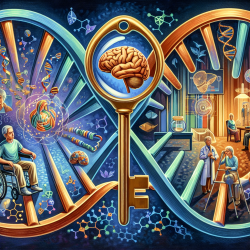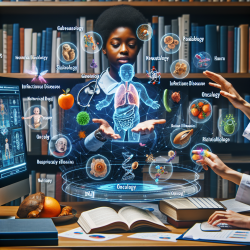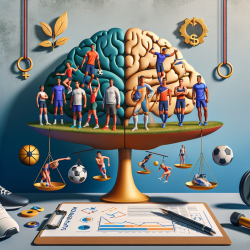Introduction
In the ever-evolving field of speech-language pathology, staying informed about the latest scientific breakthroughs is crucial for enhancing therapeutic outcomes. One such breakthrough is the research on "Whole genome deconvolution unveils Alzheimer’s resilient epigenetic signature." This study offers valuable insights that can be applied to improve therapy practices, especially in online settings like those provided by TinyEYE.
Understanding the Research
The study introduces a novel deep learning method called Cellformer, which deconvolutes bulk ATAC-seq data into cell type-specific chromatin accessibility profiles. This approach allows researchers to identify cell type-specific pathways and potential epigenetic mediators that contribute to resilience against Alzheimer's disease. By analyzing 191 samples from three brain regions, the study highlights the unique gene regulatory mechanisms in individuals who remain cognitively healthy despite a high pathological load of Alzheimer's.
Implications for Practitioners
For practitioners in speech-language pathology, understanding the cellular mechanisms of resilience can inform the development of more targeted and effective therapeutic interventions. Here are some ways to apply these findings:
- Incorporate Epigenetic Insights: Use the knowledge of cell type-specific pathways to design interventions that may enhance cognitive resilience in children.
- Personalized Therapy Plans: Tailor therapy plans based on individual genetic and epigenetic profiles, potentially improving outcomes for children with neurodevelopmental disorders.
- Collaborative Research: Encourage collaboration with geneticists and neuroscientists to integrate epigenetic data into therapy practices.
Encouraging Further Research
While the study provides a foundation, it also opens up avenues for further research. Practitioners are encouraged to explore the following:
- Longitudinal Studies: Conduct long-term studies to observe the impact of therapy interventions informed by epigenetic data.
- Cross-Disciplinary Approaches: Collaborate with researchers from various fields to explore the broader applications of genome deconvolution in therapy.
- Technology Integration: Utilize advanced technologies like deep learning and AI to enhance the analysis of therapeutic outcomes.
Conclusion
The research on Alzheimer's resilient epigenetic signatures offers a promising avenue for enhancing therapeutic practices in speech-language pathology. By integrating these insights into therapy, practitioners can potentially improve outcomes for children, fostering resilience and cognitive health. As we continue to bridge the gap between research and practice, the future of therapy looks brighter and more personalized.
To read the original research paper, please follow this link: Whole genome deconvolution unveils Alzheimer’s resilient epigenetic signature.










